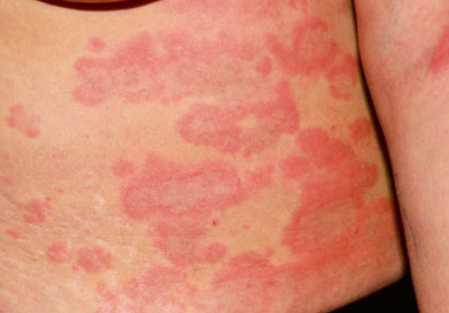History taking in a patient with urticaria

The aim of taking history is a patient with urticaria to:
- Define the types of urticaria (acute or chronic).
- Exclude associated systemic conditions.
- Recognize any triggering factor.
- Exclude anaphylaxis.
General questions to ask
- Ask about manifestation of anaphylaxis
- Chest tightness or difficulty in breathing.
- Change of voice or hoarseness o voice.
- Nausea, vomiting, abdominal pain.
- Dizziness.
- Ask about the duration, to decide the type of urticaria
- Acute urticaria: present for less than 6 weeks.
- Chronic urticaria: present for more than 6 weeks.
- Ask about previous episodes of urticaria.
- Ask about joint pain, fever, weight loss or other signs of diseases associated with urticaria.
- Ask about past or family history of angioedema.
Acute urticaria questions
- Ask about recent viral or bacterial infections ( fever, cough, sore throat, nausea, vomiting, diarrhea).
- Ask about recent use of drugs (Antibiotics – NSAIDs – supplements – other drugs).
- Ask about recent history of travel (parasitic infections).
- Ask about recent contact with pets.
- Ask about recent eating of sea food, sushi, nuts, chocolate, cheese.
- Ask about recent using of new skin care products (lotion, cream, hair dye, perfumes, etc).
- Ask about recent contact with new clothes.
- Ask about pregnancy.
- Ask about doing exercise hours before urticaria.
- Ask about recent history of insect bites or stings.
- Ask about history of radiocontrast medium exposure.
- Ask the patient if it is induced by heat, cold, pressure or vibration.
- Ask about transfusion history.
Chronic urticaria questions
- Ask about history of drugs (NSAIDS- Contraceptive pills – Aspirin- etc.)
- Ask about history of infections.
- Ask about manifestations of systemic diseases.
- Ask about history of atopy.
- Ask about sexual history.
- Ask about psychological stress.
- Ask about diet changes (spicy food- alcohol).
- Ask about physical urticarias( heat, cold, exercise, pressure, water, vibration, sunlight)
- Ask about relationship to the menstrual cycle (urticaria may rarely appear 7–10 days before menstruation)
For more details:
For more details : Acute and Chronic Urticaria: Evaluation and Treatment.
#urticaria #urticaria history taking